This blog discusses how the AWS Certified Data Engineer Associate (DEA-C01) exam equips you with the knowledge and skills to help you achieve superior data governance. It also discusses how your role as a data engineer is to get data from sources, make it useful, and serve it to stakeholders. It also emphasizes your responsibilities as a data engineer, which include establishing and enforcing data governance policies and standards and ensuring that data is used compliantly and ethically.
Highlights: AWS Certified Data Engineer Associate Exam
Launched in March 2024, the AWS Certified Data Engineer Associate(DEA-C01) certificate benefits job seekers and employers. The certificate offers a platform for developing and hiring qualified data engineers who can analyze, manipulate, and ensure high-quality data for insights and analysis that drive business outcomes.
Professionals can leverage this certificate to validate the following data engineering skills:
- The ability to implement data pipelines, monitor and troubleshoot issues, and optimize cost and performance
- Skills and knowledge in core data-related AWS services and how to use these services to analyze data, verify data quality, and ensure data consistency.
Compared to our other associate-level tests, this certification is more complex. Two to three years of data engineering experience and one to two years of practical AWS experience are needed to prepare for this certification. You must have a thorough awareness of both the technical and strategic aspects of data management in the cloud environment to pass the exam. After completion of this certificate, to deepen your expertise in this domain, AWS recommends pursuing advanced AWS certifications like AWS Certified Security—Specialty.
Whizlabs AWS Certified Data Engineer Associate (DEA-C01) course integrates all these diverse skills to help you achieve this certification. With 128 videos, 35 hands-on lab sessions, and 16 quizzes for practice tests, this course ensures that every aspect of the DEA-C01 exam is covered. Sign up for this course to earn this certificate. For additional hands-on experience with the services, check AWS hands-on labs and AWS sandboxes.
Data Governance in the Exam Domain
The exam guide lists the following four domains for the AWS Certified Data Engineer Associate (DEA-C01) exam.
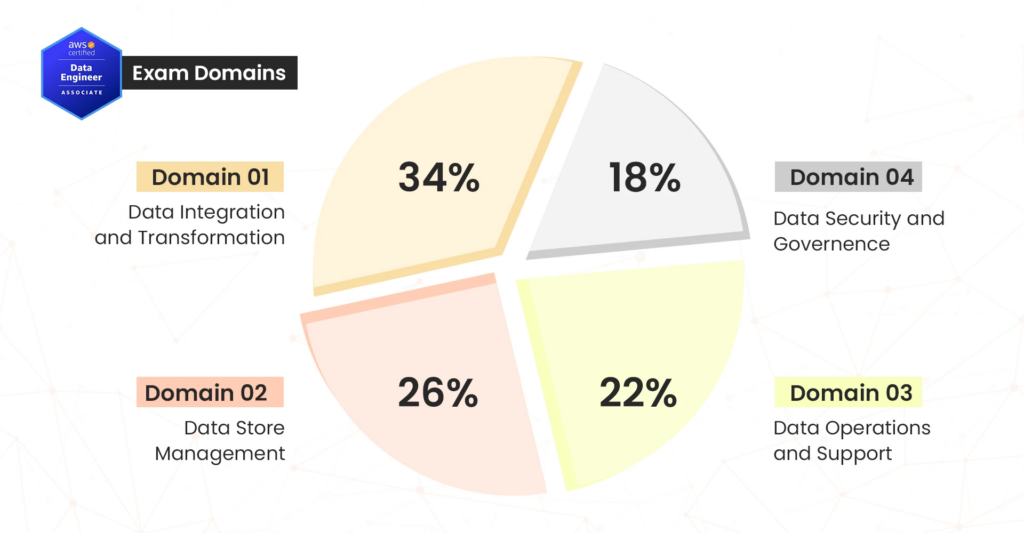
With 18% coverage, Domain 4: Data Security and Governance is the smallest domain.
However, the topics in this domain are crucial to any data management strategy. You will learn the AWS services for encryption, governance, protection, and logging of all data that is part of data pipelines.
This domain will help you implement the following tasks in AWS solutions in real life:
- Apply authentication mechanisms
- Apply authorization mechanisms
- Ensure data encryption and masking
- Prepare logs for audit
- Understand data privacy and governance
These tasks, when applied, can lead to governance excellence.
Read: Why Choose Laravel for Web Development: Top Benefits
Data Security vs. Data Governance
Data governance is a broad term that refers to different aspects of the overall management of data assets, which include availability, quality, usability, lineage, and security of the data in an organization. Data security is a subset of data governance.
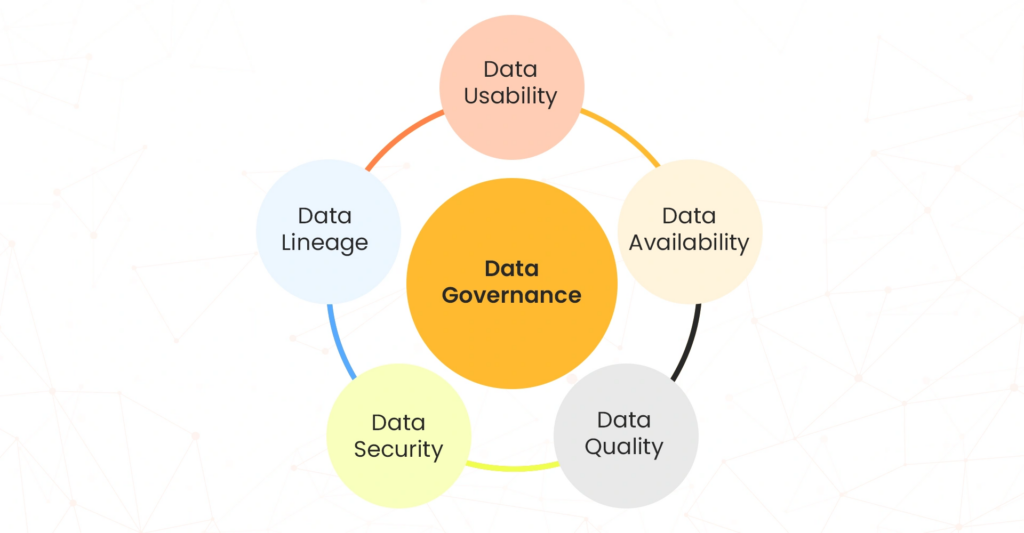
- Data usability: represents how well a user can derive actionable analytics results from the data. Governance policies rely on usability to enforce consistent data standards and practices
- Data availability: refers to the user’s ability to access and use data on time. Data availability simplifies audits and compliance reporting, a key component of governance.
- Data quality: measures the accuracy, consistency, and reliability of the data aligned with the organization’s goal. Data governance frameworks depend on accurate and reliable data to maintain trust among users and stakeholders.
- Data security: ensures your data is protected. Governance relies on security measures to ensure compliance and avoid penalties.
- Data lineage: provides a detailed view of the flow of data from its origin to its destination. Without lineage, the governance framework would lack the traceability to manage and secure data effectively.
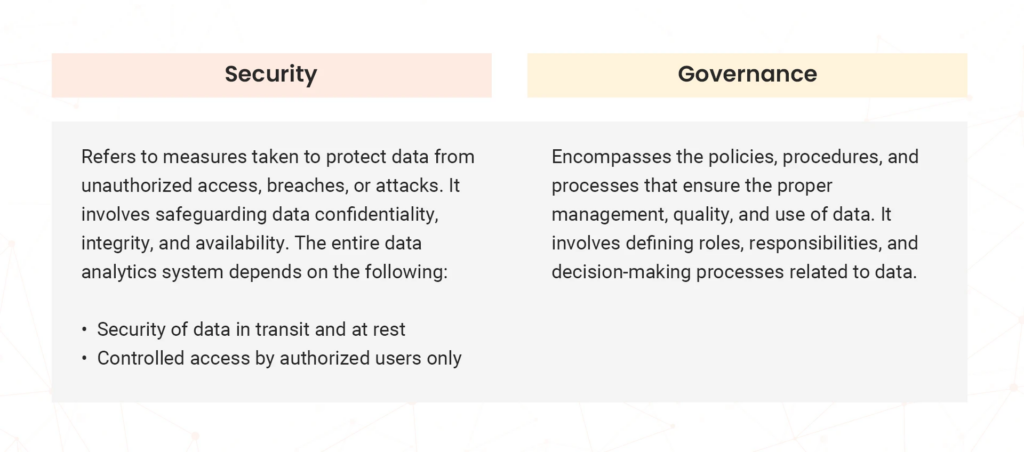
Data Engineer’s Role in Building AWS Data Governance
Building a robust data governance strategy requires members from different job functions, and data engineers are an essential part of it. As a data engineer, you are responsible end-to-end for data quality and for delivering usable, accurate datasets to the organization in a secure and high-performing manner.

Data governance is a shared responsibility. Building a successful data governance team requires a thoughtful assignment of responsibilities aligned with the organization’s unique needs. You must know what your roles and responsibilities are and the other job functions you need to communicate and collaborate with. When any governance, security, or compliance issue arises, knowing the roles of team members allows you to effectively resolve problems.
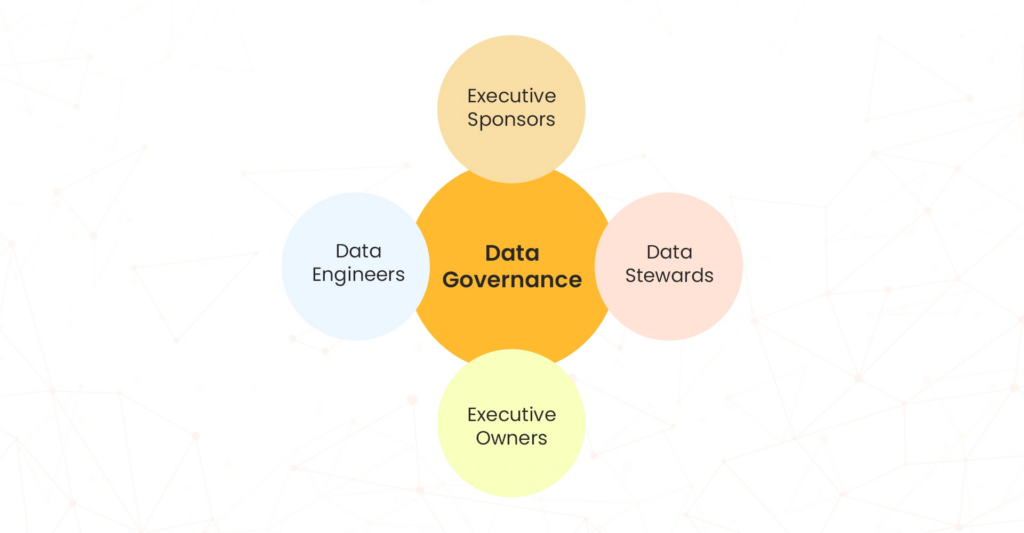
AWS Governance Framework
A data governance framework is a defined structure for managing the data lifecycle. The structure of data governance can vary depending on the organization’s objective and scope. The AWS Well-Architected Framework and the AWS Shared Responsibility Model provide best practices and recommendations to implement a robust governance framework.
In general, data governance implementation covers the following areas:
- Data ownership and accountability: Clearly defining who is responsible for specific datasets within the organization.
- Enforcing policies and rules: Applying and monitoring compliance with organizational data policies, including access control, data retention, and usage policies.
- Technical processes, tools, and practices: using AWS tools and services to automate, monitor, and ensure the governance of data within the AWS environment.
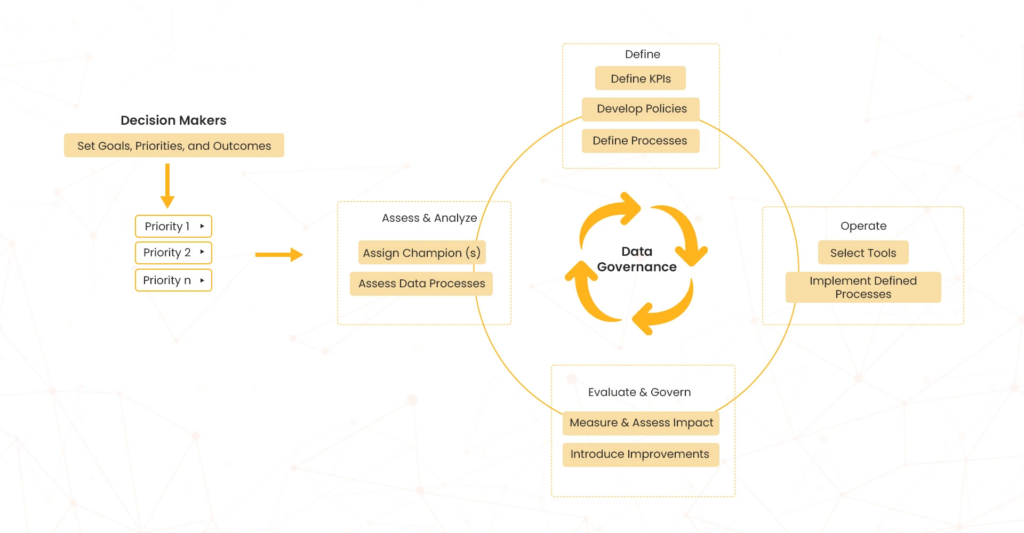
How DEA-C01 Aligns with Data Governance Goals
To meet your organization’s data governance goals, you need to select the right AWS tools and services to integrate data from various sources, secure that data, manage data quality, and find the right data.
Here are the AWS services that help achieve governance goals:
For sensitive data protection
- AWS Glue protects sensitive data in a number of ways, including data encryption using AWS KMS and data masking.
- AWS Key Management Service (AWS KMS): creates and controls data encryption keys for data at rest and in transit.
- Amazon Macie automatically discovers, classifies, and protects sensitive data in AWS, such as personally identifiable information (PII).
For access Management
- AWS Identity and Access Management (IAM): manage fine-grained access and permissions for human users, software users, other services, and microservices.
For regulatory compliance
- AWS Config: provides configuration management and auditing of AWS resources to assess security and compliance posture over time.
For data and network security
- AWS Shield: provides a distributed denial of service (DDoS) mitigation service to protect applications running on AWS from volumetric attacks.
- AWS WAF: protect web applications from common exploits and attacks and protect application availability.
For data auditability
- AWS Glue Catalog: As data moves between different data stores like Amazon S3, Amazon Redshift, and others, AWS Glue tracks these changes to metadata in the AWS Glue Data Catalog. This helps trace the flow of data.
- AWS Lake Formation: centrally manages and scales fine-grained data access permissions and shares data with confidence within and outside your organization.
- AWS CloudTrail: provides auditing and logging of API calls and management events in AWS accounts for security monitoring and compliance.
For monitoring
- AWS X-Ray: provides end-to-end monitoring and performance insights for applications running on AWS and their underlying services.
- AWS CloudTrail: provides visibility into API calls made in your AWS account. You can use it to monitor user activity and troubleshoot access-related issues.
- Amazon CloudWatch: collects metrics from AWS resources like EC2 instances, databases, and data pipelines. You can set alarms and visualize performance metrics.
- AWS Systems Manager: provides application-level monitoring for EC2 instances and helps automate operational tasks.
For evaluation
As part of the Well-Architected Framework, AWS also provides a service for reviewing your workloads at no charge. The AWS Well-Architected Tool (AWS WA Tool) helps you define and review workloads based on the latest AWS architectural best practices.
You can configure this tool to meet your security and compliance objectives such as:
- Data protection
- Infrastructure security
- Identity and access management
- Incident response
- Compliance validation

Data engineering best practices for data governance
Data engineers need to be familiar with governance best practices and stay up-to-date with the latest trends. Here are some proven techniques to build an effective data governance model.
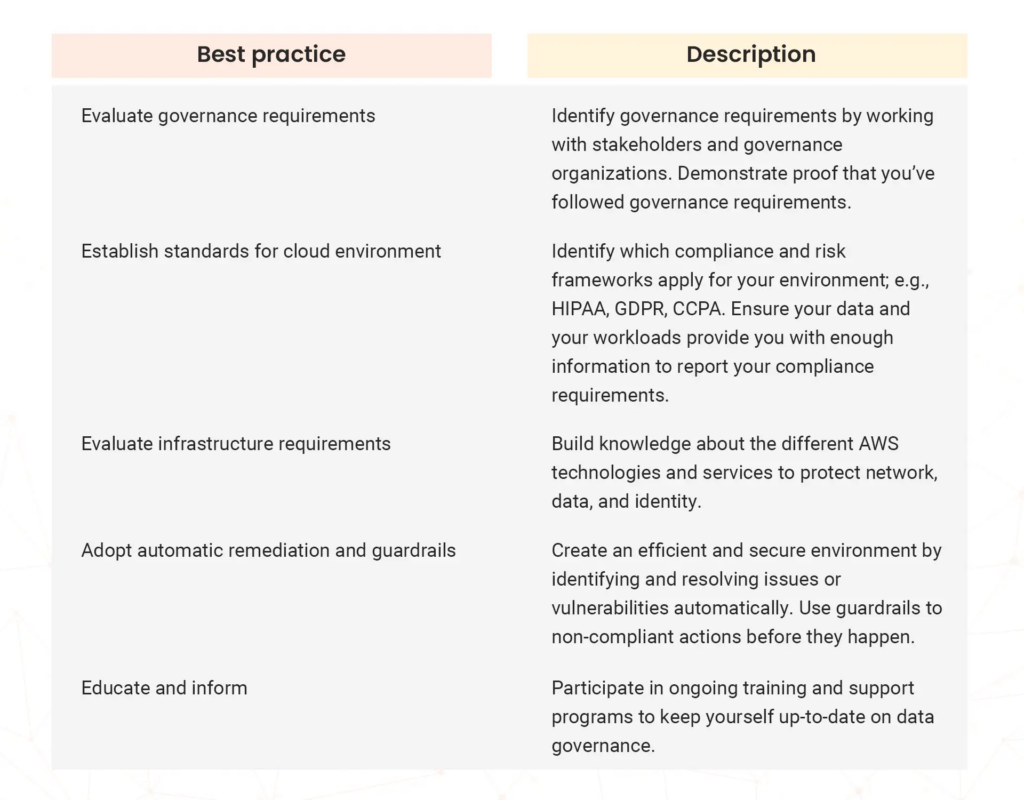
Final thoughts
Data engineering continues to be one of the most in-demand tech jobs. The AWS Certified Data Engineer Associate (DEA-C01) certification provides an opportunity to position yourself for these in-demand job roles. Data engineering in the AWS cloud demands a multifaceted skill set—you need the programming aptitude of a developer and an architectural understanding of data-related AWS services. It combines the skills of adjacent positions like software developer, data scientist, and solutions architect.

